‘Game of Thrones’ Creators’ Wild Road to Their Biggest Gamble Yet: Netflix’s ‘3 Body Problem’
- Oops!Something went wrong.Please try again later.
- Oops!Something went wrong.Please try again later.
- Oops!Something went wrong.Please try again later.
- Oops!Something went wrong.Please try again later.
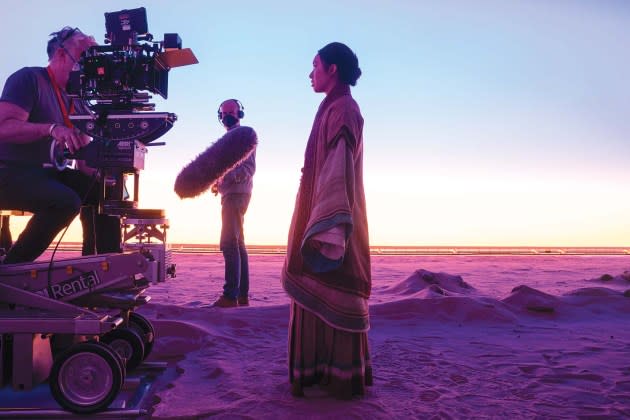
Game of Thrones ended, and David Benioff and Dan Weiss had to figure out what to do next.
The writer-producers had made the biggest TV hit of the 21st century, and the most Emmy-winning drama of all time — and it was their very first show. HBO’s Thrones had a spectacular eight-season run, a global phenomenon that was reputationally marred by a 2019 final season that fans loudly considered disappointing. In the online space, at least, Benioff and Weiss’ obsessive, day-and-night efforts to pull off a production that was unprecedented in its difficulty were shrugged aside. Psychologists call this the “peak-end rule” — how people feel about the end of something tends to color how they feel about all of it. And many fans felt raw about the end of Thrones.
More from The Hollywood Reporter
Chance Perdomo Remembered by 'Gen V' and 'Chilling Adventures of Sabrina' Co-Stars: "This Hurts"
'Game of Thrones' Showrunners Reveal Their Favorite Deaths of the Series
After the finale, Benioff and Weiss, who never participated in social media and only reluctantly gave interviews, even when Thrones’ was at its pinnacle, did what they naturally do: They went almost entirely media silent. They didn’t talk about Thrones. They didn’t talk about their joint attempts at other projects (such as a Star Wars film). They didn’t talk about their $200 million Netflix overall deal, and they didn’t talk about their upcoming sci-fi series, 3 Body Problem — which is arguably an even bigger and wilder gamble than Thrones ever was.
Now they’re ready to talk — about all of it.
1. “WE WERE ACTUALLY SCARED”
3 Body Problem is an adaptation of Liu Cixin’s Remembrance of Earth’s Past book trilogy, which debuted in China in 2008 to enormous popularity and acclaim. Six years later, when the saga was translated and released in the United States, The Three-Body Problem became the first Asian title to win the Hugo Award for best novel. Fans range from Mark Zuckerberg to Barack Obama to Thrones author George R.R. Martin. A short description goes like this: Remembrance of Earth’s Past chronicles humanity’s efforts to survive an impending invasion from an alien race that’s fleeing a dying planet. The story opens in 1967 during the Chinese Cultural Revolution and stretches to, well … to a very, very long time from now.
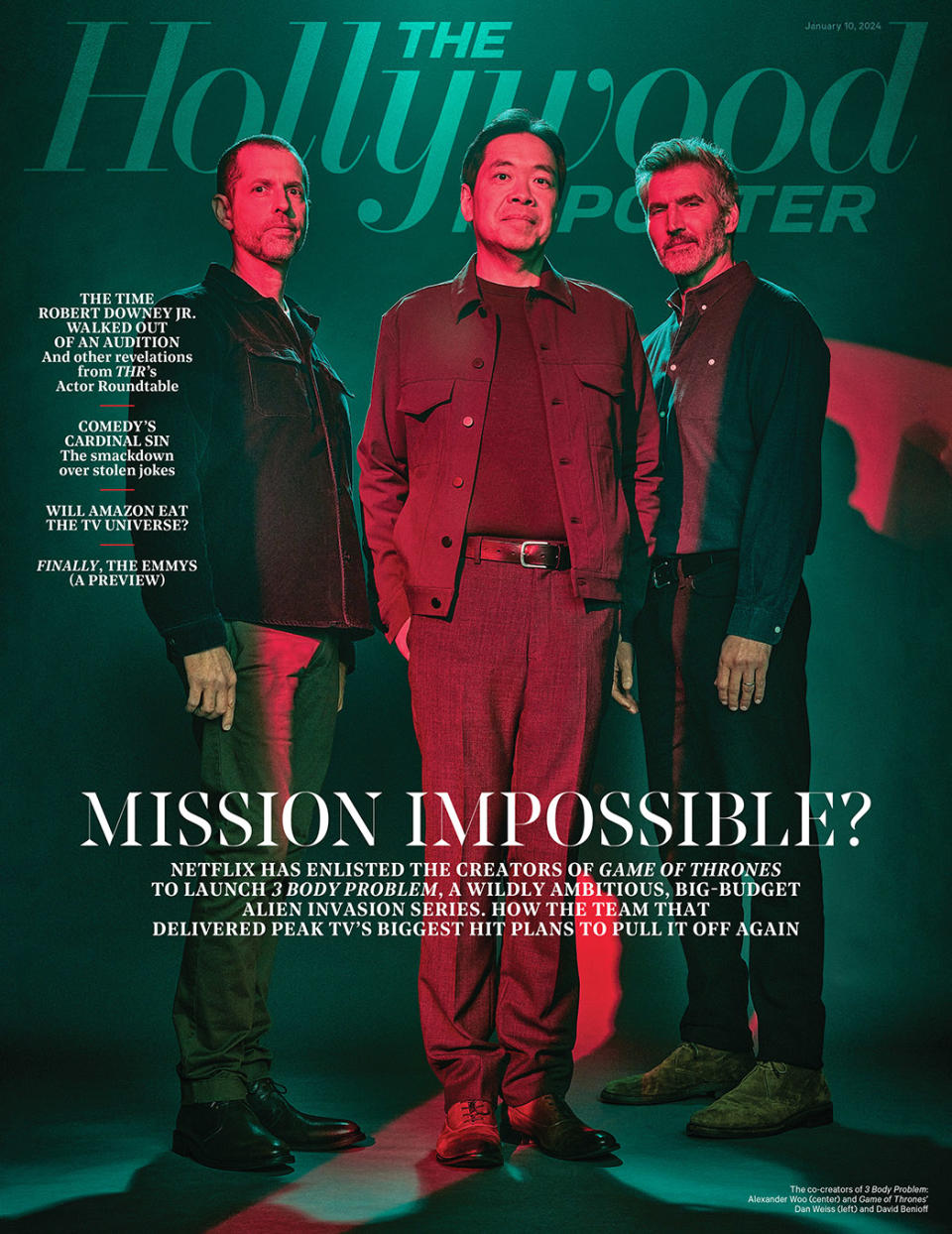
It’s a saga Netflix’s head of scripted, Peter Friedlander, had been wanting to make for years when he convinced Benioff and Weiss to take a look at the material. The duo read the books while returning from a Thrones promotional trip to Tokyo.
“We finished within 10 minutes of each other and Dan came over to my seat and said, ‘What do you think?’ ” Benioff recalls. “I said, ‘Well, that ending is amazing.’ And Dan says, ‘We’ve got to do this, right?’ ”
Says Weiss: “What excited us about Thrones when we read George’s books was that this was something we had never seen onscreen before. In a lot of ways, this couldn’t be more different from Game of Thrones, but it had that in common.”
Benioff concurs. “It was the first thing we’d come across since Thrones where we were actually scared. We knew this is going to be hard.”
In 3 Body Problem — or 3BP, bowing March 21 on Netflix — the aliens are not traveling at Star Trek-ian warp speed. It’s going to take them 400 years to reach Earth, which gives humanity quite a bit of time to strategize for their arrival — and to fight amongst themselves about what the invasion means and who might benefit. Much of the show’s first season follows a fractious group of physicists who come together under the leadership of a shadowy British intelligence chief as they spar against a murderous cult that wants to help the aliens colonize Earth. The spy chief is played by Liam Cunningham (who was Ser Davos Seaworth on Thrones) and the cult leader is played by Jonathan Pryce (who was the High Sparrow on Thrones).
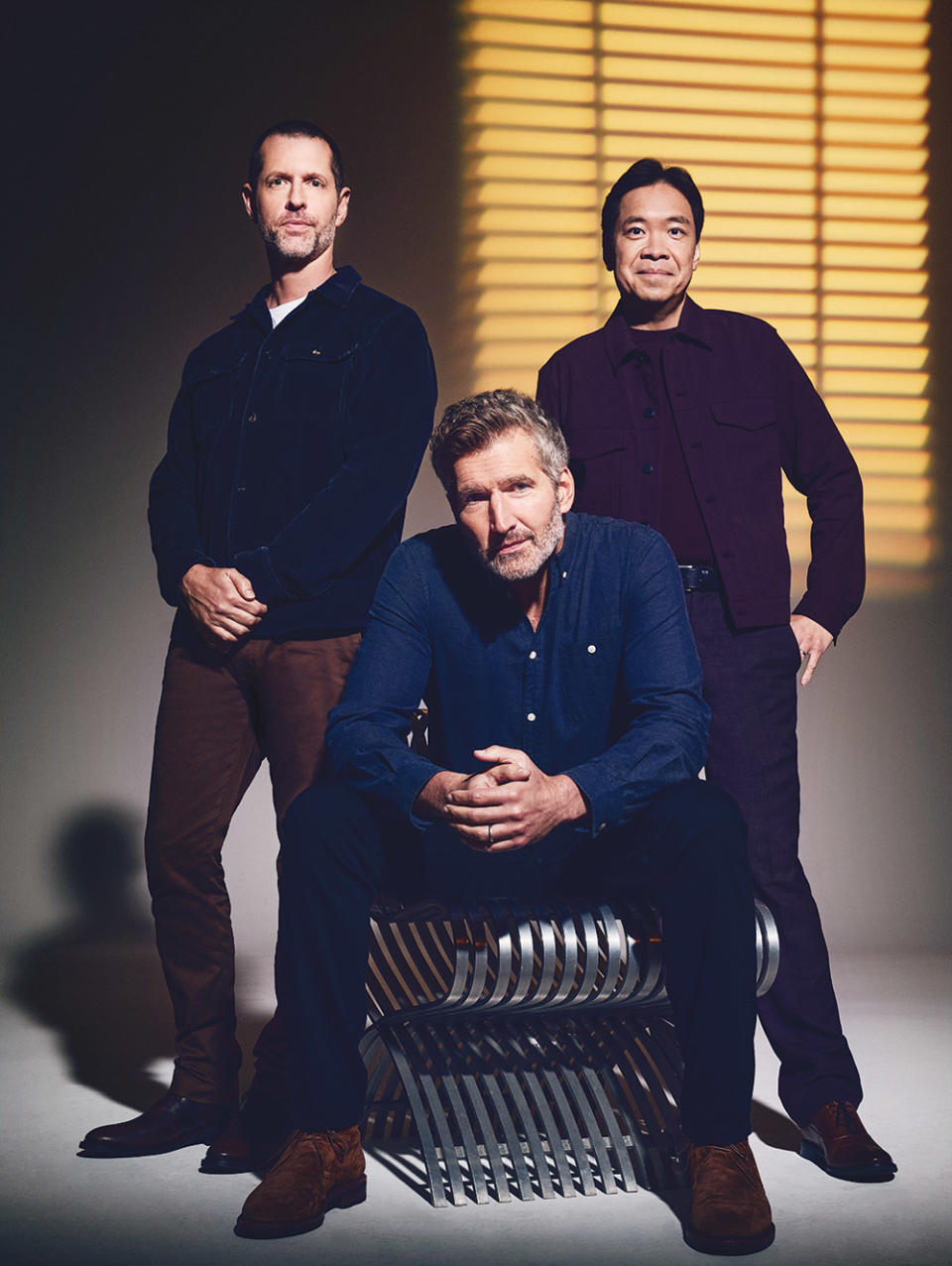
“It’s much less about fighting tentacle monsters and much more about how does humanity respond to this great existential threat?” Benioff says. “And, sadly for us, in the last few years we’ve seen that mankind doesn’t respond particularly well to existential threats. It’s hard to be idealistic and think we’d all come together if we had to. The aliens appeal to certain people who believe they’re superior to us — and, technologically, they are.”
The drama has a sprawling ensemble cast, locations around the globe, sequences set in a mind-bending virtual reality world and enough physics to fill a season of Cosmos. “There’s so many locations and none of them stick around — they’re so many one-offs,” says executive producer Bernadette Caulfield. “There’s not one regular ‘Throne room’ in the whole show.” During the cast’s first table read, actress Jess Hong (Inked), who plays physicist Jin Cheng, says, “Everyone was going up to [the showrunners] asking, ‘So what genre is this?’ And they were like, ‘I dunno.’ There are so many things happening that the blurbs you hear about the show are only the tip of the iceberg.”
Benioff and Weiss feel the heavy weight of expectation surrounding the project. And given the industry’s recent extensive belt-tightening, the bar for earning a second season for a lavishly produced sci-fi series is likely higher than it was a few years back. “It would be hard for us to feel more pressure than we already do,” Weiss says.
Because 3 Body Problem isn’t just about launching a new show, of course. It may be odd that two guys coming off a blockbuster hit with so many Emmys would need to prove themselves, but they do, and they know it.
“It’s great we won a bunch of awards, but that was a while ago,” Benioff says. “You have to keep proving yourself.”
“2. HBO WAS KIND OF CONFUSED”
To help adapt the books — and to properly incorporate the novel’s Chinese pedigree — the duo brought aboard a third showrunner, Alexander Woo, who was also a writer-producer on a hit HBO genre drama adapted from a series of books (True Blood). “One thing that really attracted me as someone who’s Chinese American, as opposed to Chinese from China, is that I’m the child of immigrants, and this is kind of an immigrant story,” Woo says. “The aliens are looking for a safer place to live, and the people who live there don’t want them.”
Yet before signing on, Woo had a chat with Thrones co-executive producer Bryan Cogman and asked him what it’s really like to work with Benioff and Weiss. “Bryan said, ‘You won’t find a single person who worked on Game of Thrones with a single bad thing to say about either of them. They’re genuinely great, decent people,’ ” Woo recalls.
It’s a quote that’s likely to rile those who snark about Benioff and Weiss on Twitter and Reddit, and, to be fair, not all the online acrimony is about their creative decisions. Benioff and Weiss can sometimes come across as dismissive of fan feelings. Even if they privately agree with a Thrones criticism, they feel it wouldn’t benefit themselves, HBO or the thousands of others who worked on the show to say so.
“You always hope everyone’s going to love anything you do and it would’ve been great if 100 percent of people loved it, but they didn’t,” Benioff says of season eight. “You can get so bogged down in public opinion that you spend your whole life googling things and trying to find people who felt one way or the other way.”
Adds Weiss, “Even super positive feedback makes you feel weird and teeth-grindy and on edge. There’s a drug quality to the feedback, and as soon as we went cold turkey — the last time I googled myself was in 2013 — the ambient stress level in our lives dropped by about 50 percent overnight.”
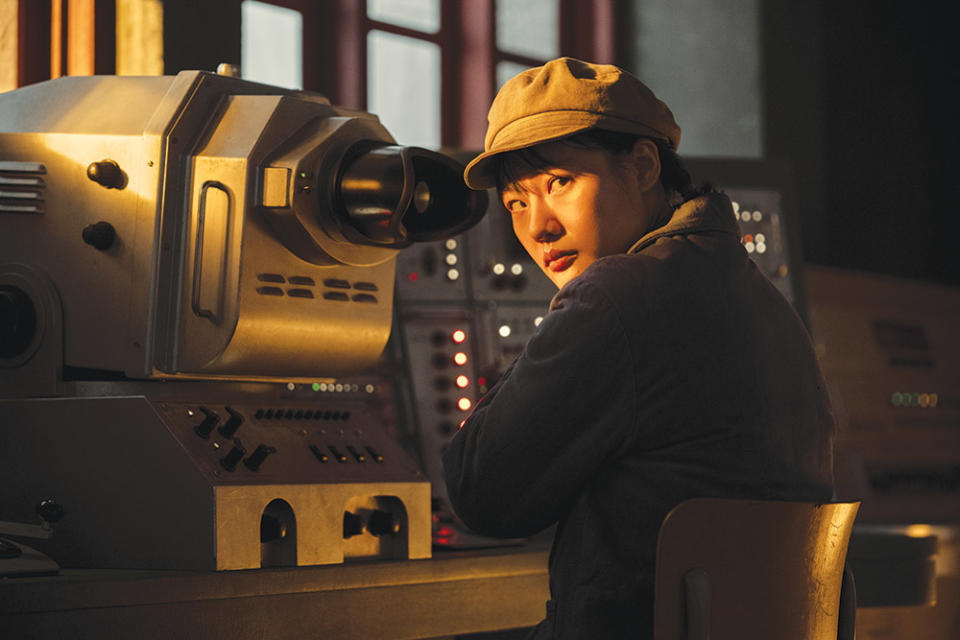
The duo have run into fans in real life since Thrones ended. These encounters, they say, have gone fine. “There’s an underlying decency when people acknowledge you as a person and vice versa,” Weiss says. “There’s something that happens in the transition from human interaction to online that pushes things in a specifically aggro direction.”
When Benioff and Weiss wrapped Thrones, many fans assumed they deliberately rushed the show to an early conclusion. They had actually said since season two that they planned on making roughly seven seasons (whether this was ultimately the best strategy or not). Another common assumption is that they ditched Thrones to make more money elsewhere. One of their little-noticed decisions goes against that idea: As the creators of Game of Thrones, Benioff and Weiss were contractually guaranteed producer credits on all future Thrones spinoffs — a lifetime of franchise mailbox money for doing nothing on House of the Dragon, for starters. And they turned it down. Nobody does this.
“HBO was kind of confused,” Benioff says. “I remember their lawyer saying, ‘But it’s just money, we’re just going to pay you.’ ”
Adds Weiss, “I don’t think there is such a thing as free money. For us, if our name is on it, especially that, while being completely detached and uninvolved, it felt like the strain that would come with that hands-off approach — with its success or failure or anything in between — was not worth it.”
No, they haven’t watched Dragon. Weiss recently rewatched Thrones with his family but resists efforts to get him to reflect on the result. Benioff hasn’t watched a Thrones episode since the finale. (He’s currently enthused about Max’s animated series Scavengers Reign.)
After Thrones, Benioff and Weiss’ next TV project was supposed to be another HBO show: Confederate, a series order for which they brought on writers Malcolm Spellman (Empire) and Nichelle Tramble Spellman (Truth Be Told). Confederate was envisioned as an alternative-timeline drama in which the South has successfully seceded from the Union, slavery is still legal, and a new Civil War looms. The idea was to tell an anti-racism story, but all corners slammed the concept as woefully wrongheaded, and the project blinked out of sight. When asked about the Confederate reaction, Benioff and Weiss look stricken and take a long time to respond.
“It’s kind of a low point,” Weiss says softly. “You try things that feel like they are worth doing and some of them work out, and some don’t.”
Next was their Star Wars movie. Fans were excited by the idea of the Thrones guys bringing their grounded-fantasy dramatics to a galaxy far, far away. Yet the movie was shelved along with Star Wars projects from other top creatives (like Kevin Feige, Patty Jenkins and Damon Lindelof).
“We wanted to do The First Jedi,” Benioff says. “Basically how the Jedi Order came to be, why it came to be, the first lightsaber …”
“And we were annoyed as hell when [Rian Johnson, the duo’s longtime friend and 3BP producer] called his movie The Last Jedi,” Weiss says dryly. “He completely destroyed the obvious title for what we were working on.”
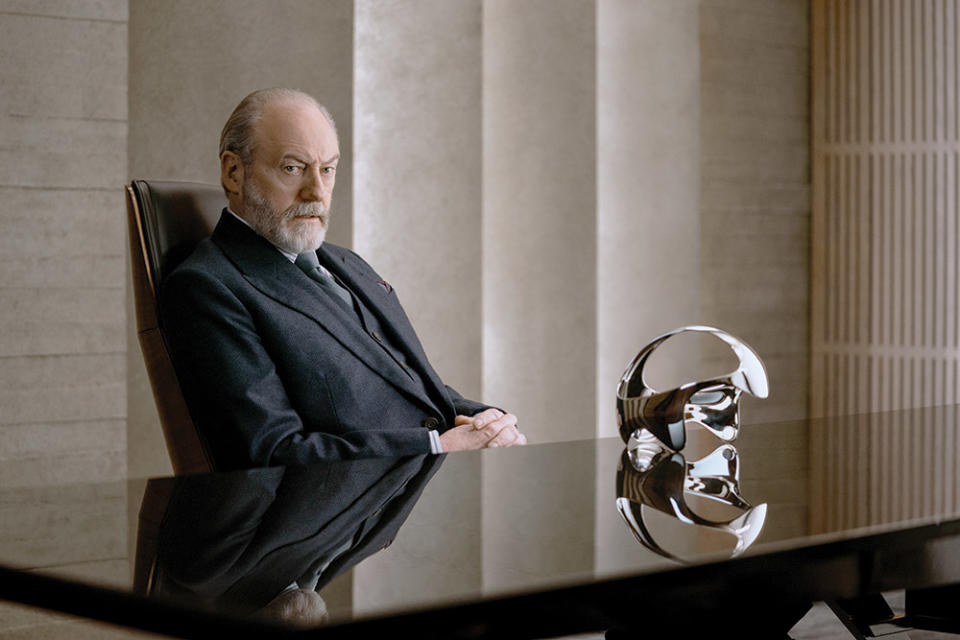
Asked what went wrong, Benioff says, “[Lucasfilm] ended up not wanting to do a First Jedi story. We had a very specific story idea in mind, and ultimately they decided they didn’t want to do that. And we totally get it. It’s their company and their IP, but we weren’t the droids they were looking for.” (Their overall concept still might happen — last year, Lucasfilm announced a movie titled Dawn of the Jedi from director James Mangold.)
Benioff and Weiss were pitched other shows, including fantasy titles, which were the last thing they wanted to make. “It was really important to move on and put Westeros behind us,” Benioff says. Then they had that fateful dinner with Friedlander, who is dubbed “Employee No. 1” inside Netflix because he was the streamer’s first major hire for its original programming team back in 2011. It’s an unusual situation — admirable even — that such a challenging and tough-to-market book as The Three-Body Problem was championed for so long by a studio executive.
“This project feels very personal to me,” Friedlander says. “The experience I had reading the books was unlike any that I had ever really had before. I didn’t know what the show would be — how do you process the size of the universe, the size of infinity? These concepts are very hard to embrace, and the way the author wrote about them takes your breath away. I’m proud of pushing through a story that is entertaining and has a wonderful message.”
3. “THE CRAZIEST MEETING OF MY CAREER”
The showrunners had a Zoom meeting with author Liu Cixin, who made it clear he was comfortable with major adaptation changes. “The first thing he said was what a big fan of Thrones he was,” Woo says. “He then said, ‘I know you’re going to have to make a lot of changes.’ We had Liu’s blessing to adapt the show in the way that we saw fit.”
One of the biggest creative shifts is that 3BP is now a global story (the first season is mainly set in the U.K., with sequences in China, Panama and the United States) and stars an international cast (including Eiza González, Rosalind Chao, Alex Sharp and Jovan Adepo). It can be very risky for a Hollywood production to shift an Asian story to a more Western perspective, as seen by the backlash to films like Ghost in the Shell. Last year, The New York Times predicted that “comments about appropriation and cultural sensitivity will start to pour in minutes after the [Netflix 3BP] episodes are posted.”
“I don’t think people understand how monumental the novel is in our part of the world,” says Hong Kong director Derek Tsang (Better Days), who helmed the season’s first two episodes. “It’s considered the sci-fi novel that made people aware of what the genre can be. But it’s not an easy read, and I give a lot of credit to David and Dan for making it more accessible. They also wanted to be as authentic as possible, and there’s no way I feel like they were appropriating our culture.”

Producers point out that 3BP rights holder Yoozoo Group, a gaming company, specifically wanted the streamer to make an English-language adaptation. This is mainly because Netflix isn’t available in China and a Chinese streaming platform, Tencent, already had the rights to make a Mandarin version. Last year, Tencent released its ultra-faithful adaptation, titled Three-Body, with its whopping 30 episodes covering just the first book (Netflix’s first season is eight episodes). Many have portrayed the two shows as rivals, with one viral comment declaring, “Three-Body is a story full of Chinese elements told by we Chinese from our Chinese perspective and ways of thinking … these things are very hard for foreigners to express — only we are able to do it.”
Says Woo, “It’s been our directive to do a global show from the beginning, and the Chinese-ness of the book’s philosophy is preserved in some of the characters.” And Cunningham points out that Liu’s epic lends itself to a narrative scope that expands beyond one country. “The diversity in the story is integral to the story,” he says. “If we’re doing a story about humanity, it should concern all of humanity, you know?”
In one respect, Netflix’s show is able to be more faithful to the book than the Chinese series. The story’s first act is set amid the Cultural Revolution, a violent period of political upheaval that the Chinese Communist Party (CCP) has been trying to erase from history. “It’s harder and harder these days to do anything that portrays that period,” Tsang says. “It’s an important part of our history and something we can all learn from if we deal with it truthfully. It’s important to show how irrational it was in those days for everyone.”
The show opens with a sequence directly from the book in which a young astrophysicist, Ye Wenjie (Zine Tseng), watches in horror as her professor father is subjected to a “struggle session” — forcing a dissident’s confession through humiliation and abuse — before a jeering crowd (it plays like a ripped-from-history version of the “Baelor” episode of Thrones). The Chinese series contains only vague references to the Revolution, and didn’t show the book’s brutish portrayals of the Red Guard.
“It’s a sensitive time period,” says Tseng, a Taiwanese actress cast right out of arts school who gives a particularly powerful performance. “Before filming, Derek told all the Chinese cast: ‘We are doing this to honor Chinese culture.’ ”
Adds Woo, “None of us are writing with any particular ax to grind in relation to China. But, yeah, we don’t have to worry about censorship.”
Another sensitive issue came about when Liu made headlines in a New Yorker interview expressing support for China’s mass internment of Uyghur Muslims. Five Republican U.S. senators sent a letter criticizing Netflix’s relationship with the author, while Netflix countered that his comments have nothing to do with the series. “They tried to use that as a culture war hobbyhorse to score a few points,” Woo says. “But it hasn’t impacted our ability to make the show.”
Then came the murder.
In 2020, the show’s producing team was dealt a massive shock when Yoozoo’s billionaire founder and 3BP producer, Lin Qi, was killed in Shanghai. According to media reports, the culprit was one of Lin’s own executives, a man with the surname Xu, who ran the company’s film division. One Chinese outlet claimed Xu was a massive fan of Breaking Bad and suggested that his idea to poison Lin was inspired by the series. It was such a weird and synchronous twist — that the 3BP mogul’s killer may have been influenced by another 21st century prestige drama series and Thrones’ Emmy rival. Benioff emailed the news report to Breaking Bad creator Vince Gilligan and wrote: “What have you done?”
“It was certainly disconcerting,” Benioff says. “When you work in this business, you’re expecting all sorts of issues to arise. Somebody poisoning the boss is not generally one of them.”
Yet not everyone was shocked. Back in 2018, Amazon Studios had negotiated with Yoozoo for The Three-Body Problem rights (Jeff Bezos is a fan). The studio’s drama team, then led by Sharon Tal Yguado, attached Rian Johnson and spent eight months trying to make a deal. Their talks culminated in a wild meeting in Los Angeles with a Yoozoo contingent led by Lin, who arrived “dressed like a gangster and put his feet up.”
“It was the craziest meeting of my career,” says one of two executives THR spoke to who were in the room. “[Lin] was so obnoxious. We were one minute away from signature when their CEO suddenly said, ‘Let’s do a joint venture instead’ ” — which effectively blew up the deal.
The insiders recall that several Yoozoo team members seemed upset by their boss’ last-second maneuver, including one in particular — Xu Yao, the executive later charged with Lin’s murder. “Their group went out of the room and it was very dramatic. You could tell there was all this tension between them.” When Lin was killed two years later, “I wasn’t surprised.”
4. “IT’S GOING TO PROVE A LOT OF PEOPLE RIGHT”
Among the project’s far less scandalous issues is that most of the core characters in the books never even meet. The showrunners solved this by making five key characters friends from Oxford when a series of mysterious and seemingly impossible events draw them back together years later. One is a cheeky and audacious former physics student named Jack Rooney (John Bradley, who played the lovable Samwell Tarley on Thrones), who uses his science talent to invent more addictive snack foods.
“Dan and David said, ‘It’s a character that’s as close to you as you’ll ever play,’ ” Bradley says. “And it’s interesting when somebody says they’ve written a part that they think is you because, it’s like: ‘What do you think I’m like?’ I just think they were sick of people saying how nice I am all the time.”
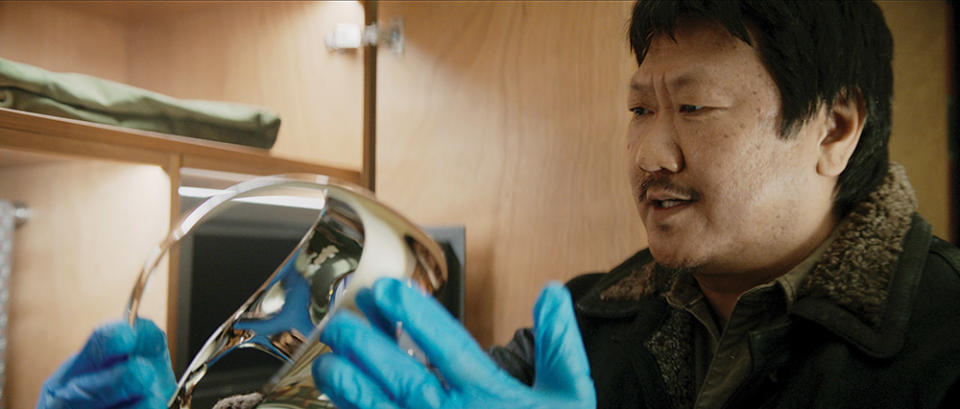
Perhaps the show’s most familiar actor for American audiences is Benedict Wong, who has played Marvel fan favorite Wong across six MCU films and counting (adding his sorcerer character into MCU films, Wong jokes, is like the “more cowbell” of the franchise). Wong plays Da Shi, a no-nonsense ex-cop investigating a series of physicist suicides.
Wong likewise says his character is the closest he’s been onscreen to his actual personality and relishes getting to use his native North England accent. “[The showrunners] gave me this [character] biography — Da Shi is from the north and his parents are from Hong Kong, and I’m like, ‘Hang on, this is like me. Did they sniff around my Wikipedia?’ ” Wong says. “For the best part of eight years, the business didn’t know how to properly represent me. I feel I’m unveiling myself.”
All the science in the novel presented a unique obstacle as well. Quantum theory, orbital mechanics, astrophysics and nanotech all have roles to play. Even the show’s title is a physics reference — a “three-body problem” refers to the unpredictable movements of a trio of celestial bodies that orbit one another. It’s an issue the aliens are facing because they live on a chaotic planet that’s bounced between the orbits of multiple suns (their home is a literal world of ice and fire). “A book can give you a little two-page physics lesson, but you can’t do that in a show without grinding the momentum of the show to a halt,” says Weiss. “We had to figure out how to represent things visually.”
One striking sequence in the show’s VR world (which one of the show’s special effects artists called “the design Olympics”) involves a hundred naked background actors howling in terror as they suffer a cataclysmic weather event. “I hadn’t seen a hundred terrified, screaming Chinese people in one place since the buffet line at my wedding,” Woo quips. (The nudity is a one-off, by the way — unlike Thrones, the first season of 3BP is a sex-free tale, though there is violence.)
The first book’s story, however, is arguably the saga’s weakest, setting up more dramatic future events (the producers say the show ideally spans four seasons). “The second book is far better than the first, and the third book just completely blew my mind,” Benioff says. “So I feel if we survive to the second season, we’re going to be in a good place. Things wildly escalate and there’s one scene, if we get to it, we’re golden — like when we got to the Red Wedding on Thrones.” They hope to enlist Johnson to helm an episode; scheduling conflicts prevented the Knives Out director from getting behind the camera during their first go-round.
Of course, 3BP needs its debut season to break through with viewers in order to get that renewal. The nearly verbatim Chinese adaptation did not make much of an impact (which is either a good or bad thing for Netflix’s version, depending on how you look at it). “During the first couple of seasons of Thrones, a lot of people were like, ‘Why didn’t they put in this scene?’ They wanted a literal adaptation of every single page,” Benioff says. “I always wondered, ‘Would people like that if they actually got it?’ Now we have that with this, where there’s one extremely faithful adaptation and then ours, which is less so, and others can judge how they stack up.” It could also be that there’s simply no such thing as a perfect adaptation of Cixin’s boooks — a three-body problem is, after all, generally considered unsolvable.
Like the Chinese version, Netflix’s series originally was supposed to debut last year. The reason for its delay speaks to the showrunners’ perfectionism: They wanted to add just one more scene when the writers strike hit, and then held the show for months to squeeze it in.
“We got the scene written the day before the strike,” Weiss says. “It was literally five pages, but we really thought it was worth doing. Netflix was great about it. It would have been very easy for them to be like, ‘You have a finished show that is ready to air, for us to hold that [for a scene that’s] five minutes of two people in a bar …” (Pushing the date, Friedlander insists, was “not a hard decision … I want to tell the best version of this story.”)
That 3BP is the main creative output from Benioff and Weiss’ overall deal adds even more importance to the project (the duo also executive produced the short-lived dramedy The Chair, and Weiss wrote and produced the teen comedy movie Metal Lords for the service). Other Netflix creatives (like Shonda Rhimes, Mike Flanagan and Ryan Murphy) have launched multiple series over the same period.
“We work better focused on one thing,” Weiss says. “It’s the elephant strategy versus the sea turtle strategy. The sea turtle has a thousand babies and points them all toward the ocean and hopes 10 make it. An elephant puts two years into one baby and guards it with its life and is devastated if the poachers come knocking. There are people who do amazing-amazing stuff while overseeing many projects at once, and I respect their ability to do that. It’s just not what we’re good at.”
Adds Benioff, “If we’re going to be on set every day — which is how we work — you can’t do that with multiple shows.”
Bradley — who has gotten to know Benioff and Weiss pretty well since they plucked him out of obscurity as a working-class actor for Thrones — says he hopes 3 Body Problem doesn’t just become a hit, but serves as a redemption of sorts.
“They’re quite aware lightning striking once is rare enough,” Bradley says. “They know there’s such a greater degree of expectation on them than on Thrones because they have a reputation to uphold. Certain people who still have an attitude toward Thrones are maybe looking to see them not hit the mark this time. That’s in the back of David and Dan’s mind — because how could it not be? I think people are going to see this and re-reevaluate them and realize just how great they always were. It’s going to prove a lot of people right, and, maybe, a few people wrong. They’re still trying to break the boundaries of what television can be.”
This story first appeared in the Jan. 10 issue of The Hollywood Reporter magazine. Click here to subscribe.
Best of The Hollywood Reporter
A 'Star Wars' Timeline: All the Movies and TV Shows in the Franchise
'Star Wars': 16 Animated Characters Who Made the Leap to Live-Action
Power Showrunners: Hollywood’s 50-ish Most Influential Writer-Producers of 2023

